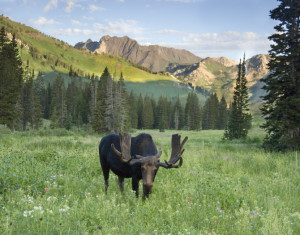By Mayor Ralph Becker for EDR Blog.org
Our urban communities adjacent to the Central Wasatch Mountains have an intimate and interdependent relationship with the mountains. In essence, our health, security, and economic prosperity are dependent on this mountain range. They provide clean drinking water, clean air, diverse recreational opportunities, and landscape-scale habitat protection. And, as the defining landscape, the Central Wasatch Mountains probably define our place and our future more than any other placemaking feature.
In the last decade, conflict surrounding the Central Wasatch has become increasingly intense. Proposed expansions of ski areas conflict with other recreational uses. Proposals for more development conflict with environmental protection goals. The previously proposed, and now dormant, “Ski Link” legislation (“Wasatch Range Recreation Access Enhancement Act”; http://www.gpo.gov/fdsys/pkg/BILLS-112s1883) and pending Wilderness legislation (“Wasatch Wilderness and Watershed Protection Act; http://thomas.loc.gov/cgi-bin/bdquery/D?d113:5:./temp/~bdpedR::) were put forward as responses to conflict, but also created more intense conflict (for example, see http://www.sltrib.com/sltrib/politics/52938575-90/access-canyon-canyons-cottonwood.html.csp and http://archive.sltrib.com/article.php?id=9301822&itype=storyID ) . It seems everywhere we turn these days, new conflicts regarding land use, recreation, and water resources emerge in the realm of jurisdictional decision-making and through the court systems. The picture being painted is one of an increasingly distributive environment, where each proposal has, or is perceived to have, winners and losers (http://archive.sltrib.com/article.php?id=14362694&itype=storyID) http://archive.sltrib.com/article.php?id=23081467&itype=storyID) (http://www.sltrib.com/sltrib/news/57524005-78/jones-alta-lake-rights.html.csp) (http://www.deseretnews.com/article/865552903/Wasatch-Canyons-symposium-airs-challenges-for-balancing-competing-needs.html?pg=all) .
The major underlying factor of conflict in the Wasatch Mountains has to do with the many different ways we value and relate to the mountains. It is not as simple as “environmental protection vs. economic growth”, although much of the conflict tends to be framed that way. I think the conflict stems from much deeper and long-established institutional and personal relationships with the Wasatch. From the institutional standpoint, conflict occurs because there are numerous jurisdictions with varying missions and management goals making decisions about different, yet interconnected, elements of the Wasatch. The US Forest Service, the major land owner in the Wasatch, manages the federal lands in the area for multiple uses (http://www.fs.usda.gov/uwcnf). The Counties and cities in which the mountain range is situated are charged with planning and zoning (http://slco.org/byTopic/Planning/index.html) (http://www.co.summit.ut.us/communitydevelopment/planning.php) (http://www.co.wasatch.ut.us/planning.aspx) (http://www.utahcounty.gov/Dept/ComDev/Planning/index.asp) (www.townof alta.com)..
Numerous other agencies are mandated with managing natural resources, including other Federal, State, and local entities (Salt Lake City has watershed and water resource management responsibilities that are recognized and prioritized in state and federal law – www.slcgov.com/utilities). While tremendous successful efforts have occurred over the last several decades for jurisdictions to work cooperatively in managing the Wasatch, the combination of increased development and use pressures, changing demographics and increasing population, and other issues, such as climate change, intensify a fragmented, piece-meal approach to managing the Wasatch. And, the pressures aren’t just for increasingly scarce terrain; our transportation systems in the Central Wasatch are becoming increasingly congested and require long-term solutions

In addition to institutional relationships, each of us hold differing personal values and opinions associated with the Wasatch Mountains. I recently overheard a conversation while waiting in a lift line at Alta where two people were discussing the idea of a new chairlift or tram being developed from Brighton Ski Resort to the Canyons Ski Resort. The two visiting skiers were excited about the prospect because they felt they could access more ski terrain on their visits to Utah. On the other hand, I have listened to others who are adamantly opposed to the concept of more ski lifts crossing mountain ridges, raising aesthetic, environmental, and backcountry recreation concerns. Often, even our own internal values conflict. While I have heard overwhelmingly that we value the natural environment of the Wasatch, and we want to continue to have clean water and healthy ecosystems, we also want and value more access and more recreational options in the Wasatch Mountains. These internal values conflict with each other when cumulative impacts of increased access and use threaten to degrade the natural environment.
This brings me to the questions this blog will explore, hopefully with your input, over the course of the next few weeks. Can the Mountain Accord process resolve jurisdictional and value-based conflicts (www.mountainaccord.com)? Are we addressing the true nature of the conflict in the Mountain Accord process? What are other overarching goals of Mountain Accord? Can the process serve as a model for other areas with environmental issues similar to ours?
From my perspective, as long as we are careful and deliberate in how we go about implementing Mountain Accord, we will resolve major conflicts, protect the Wasatch Mountains, and balance community values. I view the Mountain Accord as our collective community’s “grand conversation” about the future of the Central Wasatch Mountains. And, with some good will and mutual respect, we can arrive at a “grand bargain” that will preserve the characteristics we hold most dear for our Wasatch Mountains. In my next writing, I will describe the Mountain Accord process, and share my perspectives as an active and engaged participant.
Ralph Becker is Mayor of Salt Lake City and is an important voice for the Mountain Accord, a new initiative seeking input and making decisions on the future of the Wasatch mountains and surrounding community. For more information, go to http://www.mountainaccord.com/index.php.
